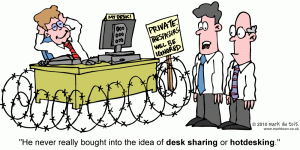The public sector is under increasing pressure to produce and deliver more for less and in less time, hence, cuts in health and social care sectors run deep and across formal and informal divides.
The contested Barnet graph of doom which was used in the Guardian Local Government Network debate on “How can we work together to save social care?” to highlight some of the challenges that many local authorities face, while trying to manage and match the increasing needs of adult social care and children’s services with shrinking resources and budgets. In this process, among the various strategies of different councils has been that of a reduced and more flexible workforce, supported by mobile technologies that allow 24 hour connectivity and remote working. In fact, the Evening Standard reports that:
Taxpayers are to save £62 million in a pioneering office move involving more hotdesking and flexible working by civil servants.
Some 500 officials at the Department for International Development are using laptops at shared desks after moving into a new “minimalist” HQ. The move from offices near Buckingham Palace to an empty government block in Whitehall will save almost £10 million a year between now and 2020 in rent and overheads. There will be seven desks for every 10 staff, and Wi-fi and video conferencing are being used to cut journeys.
However, for many social workers, working at the sharp end of adult or child protection, hotdesking has been a reality (for most) for some time, with many from the profession debating the merits and short comings of such an approach. Therefore, in Tuesday’s (26 February) debate we wish to consider the question of hotdesking in conjunction with shrinking investment in human resources, and consider its implications and significance for professional identity as well as a culture of work and its values.
Therefore, in Tuesday’s debate we hope to explore some of the following questions:
- How does hotdesking impact on organizational culture in the public sector in general and in social work and social care in particular?
- Is hotdesking an inevitable consequence of the recent advances in technology?
- Can hotdesking be applied to all professions and professionals? or are there some professions where hotdesking would not be appropriate?
- Does hotdesking lead to greater productivity or does it result in a demoralised workforce and impacts productivity and outcomes negatively?
- Is hotdesking always a consequence of mobile working? Or are there situations where hotdesking is not accompanied by the possibility for mobile working? If the latter is the case, what are the implications of hotdesking for social workers professional identity?
- Does hotdesking influence teamwork? If yes, does it diminish or enhance collaboration between workers?
Some other questions that we hope to examine include questions around emotional toil and professional identity. Social work involves emotional labour and the use of self which can be emotionally taxing for practitioners. Therefore, given some of the difficulties with hot-desking, does this lead to increased emotional toil for practitioners?
Is hotdesking being managed appropriately and are workers receiving adequate support, when social workers report needing to move to a different floor in the building, or at times a different building, in order to find an available desk and computer and to update their cases? Is such a situation not counterproductive?
Many social workers report that hotdesking leads to feelings of isolation and results in lack of emotional support when returning to the office, even after a difficult home visit or meeting. As workers are forced to work away from their teams, colleagues, and managers, will hotdesking eventually increase workforce fragmentation and reduce team cohesion?
Furthermore, from an organizational psychology perspective, hotdesking may lead to a loss of continuity and feeling of belonging within the team and/or organisation. This in turn can affect the individuals’ ability to identify with the organization and their professional role.
Therefore, we look forward to your views and experiences regarding hotdesking and its implications and significance. Does hotdesking enhance productivity or undermine workers’ professional identity?
Join us @SWSCmedia on Tuesday (26 February) 8:00 PM GMT / 3:00 PM EST to discuss “Hot-desking: enhancing productivity or undermining professional identity.”

